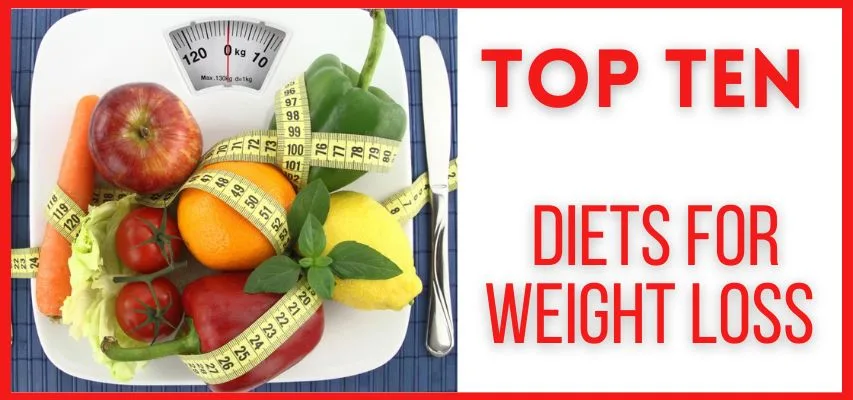Explore the top 10 diets for weight loss in this comprehensive guide. Get ready to start your journey towards a healthier you! Yet the sheer number of available diet plans may make it difficult to get started. Different diets will be more suitable, sustainable, and effective for different people. Some diets aim to curb your appetite to reduce your food intake, while others suggest restricting your intake of calories and either carbs or fat. Some focus more on certain eating patterns and lifestyle changes than on limiting certain foods.
It’s no secret that America has a weight problem. According to the CDC, nearly three-quarters of us are overweight or obese. Yet more than 160 million Americans are on a diet at any given time, and we drop more than $70 billion each year on commercial weight-loss plans, supplements, and other pound-shedding measures. That suggests that losing weight is not easy—yet it is entirely possible when done right. There are two keys to success when it comes to weight loss. The first is to find an approach that works for you specifically, one that makes you feel good and keeps you motivated. The second is to take your time—sustainable weight loss happens slowly but steadily.
Diet Dilemmas? Top 10 Diets For Weight Loss
In a world where health and wellness are of paramount importance, finding the right diet to help you shed excess weight can be a daunting task. With a plethora of options available, it’s essential to understand which diets are not only effective but also sustainable. If you’re on a quest to lose weight and improve your overall well-being, you’ve come to the right place. In this article, we will delve into the top 10 diets for weight loss, providing you with valuable insights, first-hand experiences, and information backed by credible sources to assist you on your journey to a healthier lifestyle.

1. The Ketogenic Diet
The ketogenic diet, commonly known as the keto diet, is a high-fat, low-carbohydrate eating plan that pushes the body into a state of ketosis. This metabolic state encourages the burning of stored fat for energy, making it a popular choice for rapid weight loss. However, it’s essential to understand the principles and potential side effects of the keto diet before embarking on this journey.
The keto diet is not suitable for everyone, especially those with certain medical conditions. It’s advisable to consult a healthcare professional before starting this diet to ensure it aligns with your health goals.
2. Intermittent Fasting
Intermittent fasting is more than just a diet; it’s a lifestyle change that involves cycling between eating and fasting periods. This approach can help control calorie intake, improve metabolism, and support weight loss. It’s essential to find an intermittent fasting schedule that suits your daily routine and dietary preferences.
Intermittent fasting means dividing one’s time between “eating windows” and periods of abstention regularly. A common intermittent fasting schedule might restrict eating to the hours of 7:00 a.m. to 3:00 p.m., with the remaining 16 hours of the day spent fasting. But there is no specific, prescribed schedule. Some people have more or less generous eating windows, setting the rule that they will not eat after, say, 8:00 p.m.—or, on the considerably less generous side, only allowing themselves to eat every other day.
The science behind intermittent fasting is based on altering the body’s metabolism. During a period without eating, insulin levels drop to the point that the body begins burning fat for fuel. Additionally, the thinking goes that by slowing the body’s metabolism, you cause your appetite to drop off and thus consume fewer calories when you resume eating.
3. Paleo Diet
The paleo diet focuses on consuming whole, unprocessed foods that our ancestors might have eaten. By eliminating processed foods, grains, and dairy, this diet aims to improve digestion and promote weight loss. Keep in mind that while the paleo diet has its benefits, it may not be suitable for long-term sustainability for everyone.
Some more flexible versions of the paleo diet also allow dairy products such as cheese and butter and tubers such as potatoes and sweet potatoes. The diet plan is effective in reducing heart disease risk factors such as cholesterol, blood sugar, blood triglycerides, and blood pressure.
4. Mediterranean Diet
The Mediterranean diet emphasizes fresh fruits, vegetables, whole grains, and healthy fats, such as olive oil. Known for its heart-healthy benefits, this diet supports gradual and sustainable weight loss. Incorporating Mediterranean cuisine into your daily meals can lead to positive health outcomes.
The Mediterranean diet does not make you leap through impossible hoops or push you to the point of suffering. The diet is based on foods that were eaten by people in countries such as Italy and Greece. It focuses on incorporating bold flavors and the pleasures of the table.
5. Plant-Based Diet
A plant-based diet primarily consists of foods derived from plants, emphasizing fruits, vegetables, whole grains, nuts, seeds, and legumes while excluding or minimizing animal products. It’s a dietary approach that promotes health, environmental sustainability, and animal welfare. Plant-based diets are rich in fiber, vitamins, minerals, and antioxidants while generally lower in saturated fats and cholesterol.
They have been associated with numerous health benefits, including a reduced risk of chronic diseases like heart disease, diabetes, and certain cancers. Plant-based diets are flexible and can range from fully vegan (excluding all animal products) to vegetarian (including some animal products like dairy and eggs). This dietary choice aligns with ethical and environmental concerns, making it a popular option for those seeking a healthier and more sustainable way of eating.
6. Atkins Diet
The Atkins Diet, developed by Dr. Robert Atkins, is a low-carbohydrate diet that promotes weight loss by restricting the intake of carbohydrates, especially during the initial phase. This restriction induces a state of ketosis, where the body burns fat for energy instead of carbohydrates. The diet consists of four phases, starting with a strict carbohydrate limit and gradually reintroducing carbs as one progresses.
It encourages the consumption of lean proteins, fats, and non-starchy vegetables while limiting sugary and starchy foods. The Atkins Diet aims for rapid weight loss during the initial phase, followed by slower, more sustainable weight loss in subsequent phases. It has been praised for its effectiveness in shedding pounds but has also faced criticism for its potential side effects and long-term sustainability.
7. Weight Watchers (WW)
The Weight Watchers diet aims to restrict energy to achieve a weight loss of 0.5 to 1.0 kg per week, which is the medically accepted standard rate of a viable weight loss strategy. The dietary composition is similar to low-fat diets or moderate-fat and low-carbohydrate diets, depending on the variant used.
Contrary to several other diets, Weight Watchers does not focus on calories but simplifies food selection with a points-based system named “SmartPoints,” where each food type is assigned a point value calculated according to its nutrient and energy density. A point equals 50 cal.
The point values system defines both a quality scale and a quantity limit: food with low point values, such as high-fiber carbohydrates, lean proteins, and legumes, can be consumed more freely and in higher quantities, whereas food items with higher point values must be eaten with parsimony or avoided. Most fruits and vegetables are “free,” as they have a zero-point value and thus can be consumed at will.
8. DASH Diet
The Dietary Approaches to Stop Hypertension (DASH) diet aims to lower sodium intake and emphasizes whole foods. In addition to managing blood pressure, the DASH diet can support weight loss and overall well-being. It’s an excellent choice for those looking to improve their heart health.
It highlights eating lots of fruits, vegetables, whole grains, and lean meats and is low in salt, red meat, added sugars, and fat. Although the DASH diet is not a weight-loss diet, many people have reported losing weight for it.
9. Zone Diet
The Zone diet focuses on balancing macronutrients to optimize hormonal control and promote weight loss. This diet encourages portion control and prescribes specific ratios of carbohydrates, proteins, and fats. It’s essential to understand the principles and follow the guidelines carefully.
It instructs sticking to eating a ratio of 40% carbs, 30% protein, and 30% fat. Carbs should have a low glycemic index as part of the diet, which means that they provide a slow release of sugar into the blood for longer periods to keep you fuller. Protein should be lean, and fat should be mostly monounsaturated. The Zone Diet claims to reduce the inflammation in your body.
10. South Beach Diet
The South Beach Diet, created by Dr. Arthur Agatston in the mid-1990s, was inspired by his observations that patients on the Atkins Diet were losing weight and belly fat but consuming high levels of saturated fat, which raised concerns for individuals with heart disease. Dr. Agatston sought to develop a diet that would facilitate weight loss and reduce heart disease risk while allowing “good carbs” like fruits and whole grains.
Thus, he created the South Beach Diet, rich in low-glycemic-index carbs, lean proteins, and unsaturated fats. The diet consists of three phases: a strict phase for rapid weight loss, a gradual phase for continued weight loss, and a maintenance phase. Each phase has specific food guidelines, including lean proteins, non-starchy vegetables, limited fruits, and “good carbs.” The diet aims to promote weight loss without excessive hunger and offers heart-healthy benefits by encouraging foods that fight inflammation and support cardiovascular health.
FAQs: Diets For Weight Loss
Q. Can I combine two or more of these diets for better results?
Yes, it’s possible to combine elements of these diets, but it’s essential to consult with a healthcare professional or a registered dietitian before doing so. They can provide personalized guidance based on your specific needs and health goals.
Q. Are these diets suitable for long-term use?
While some of these diets are sustainable for the long term, others may be better suited for short-term weight loss goals. It’s crucial to choose a diet that aligns with your lifestyle and preferences for lasting success.
Q. How can I maintain my weight loss after following one of these diets?
To maintain weight loss, focus on a balanced diet, regular exercise, and adopting healthy eating habits. Avoid reverting to old habits that led to weight gain in the first place.
Q. Do I need to count calories while on these diets?
Some diets, like Weight Watchers, involve calorie counting. However, many of these diets prioritize food quality over calorie counting, making them more sustainable and less restrictive.
Q. Can these diets help with other health conditions, such as diabetes or heart disease?
Several of these diets, like the Mediterranean and DASH diets, are beneficial for managing conditions like diabetes and heart disease due to their focus on whole, nutritious foods. Consult with a healthcare professional for personalized advice.
Q. Is it okay to cheat on these diets occasionally?
Occasional indulgences are acceptable on most of these diets. However, moderation is key, and it’s essential to get back on track with your chosen diet afterward.
Conclusion: The final words
Diets for weight loss have been a popular topic for centuries, and the search for the perfect plan continues. While there’s no one-size-fits-all solution, the top 10 diets listed above offer a variety of approaches to help you shed those extra pounds. From low-carb to Mediterranean, each diet has its unique benefits and drawbacks. It’s important to choose a weight loss diet that aligns with your lifestyle, preferences, and health goals. Remember, sustainable weight loss is about creating a healthy balance between diet and exercise. Consult with a healthcare professional or registered dietitian to determine the best diets for weight loss plans for you. By making informed choices and staying committed to your goals, you can achieve a healthier, happier you.


































